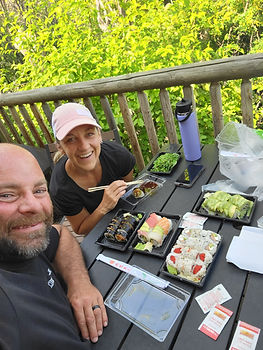Body Changes in Menopause: How to Navigate the Grief & Embrace the Growth
The menopause journey brings about consequential changes, both physically and emotionally. The approach we take to understand and be in relationship with them is crucial. From navigating body transformations to nurturing self-acceptance, this blog details the intricate process of grieving body changes in menopause and growing through it. We’ll explore the evolving landscape of body image and self-esteem, and I’ll share empowering and practical strategies for your personal body journey through menopause.
Why is Understanding Menopause Important?
Menopause: More Than Just Hormonal Shifts
Menopause is a significant life stage represented by hormonal shifts and declining fertility. But let’s be real- it’s way bigger than that! Whether you’re menopause curious and want to be as prepared as possible for what’s to come, just beginning to notice differences in the way your mind or body functions, or two decades beyond the date of your final period, understanding the menopause transition can provide at least a little calm in the eye of what you’ll often hear is a sh*tstorm!
A Personal Experience: No One Talked About It
Like so many of the women I work with though, when I started experiencing symptoms I couldn’t explain, I had only cursory knowledge about this inevitable evolution. When I asked my mom about her experience with it, sharing what I was personally observing, I was surprised to find out that she’d personally noticed… nothing.
Nothing?!
Understanding the Lack of Information
I mean, I suppose if we’re hyper-aware of what could happen, we could actually will it into place. There’s something to be said for the priming effect. If I’ve just had a conversation about a red car, I’ll be that much more likely to notice red cars wherever I go!
But she confirmed what I suspected– no one had talked to her about it. She had no depth of understanding about it beyond the fact that the period stops at some point. And she was surprised that at my age (I was about 44 at the time), any hormonal changes associated with it would be occurring.
Navigating the “Primetime” of Menopause
But I am within the typical age range to be experiencing changes in my cycle, which precipitate other symptoms that impact all the major systems of my body. The age range varies from person to person (as do the symptoms and intensity of such), but generally speaking, the mid-40’s are primetime!
Seeking Answers: Diving into Research
So given that the most important woman in my life had scant information to provide (although no information can also be quite informational!), and it seemed like all the sudden everyone and their pet lizard was talking about it, I started diving into the research myself. I read books, I consulted Google University, I took courses!
The Power of Exposure Therapy
While initially I was slightly freaked out (just slightly, okay!), by exposing myself to more and more quality evidence-based information, I began to feel more comfortable. Even as I was feeling uncomfortable with the actual symptoms!
Crazy, right?
It’s quite simple, actually, what happened. Exposure therapy is well documented to be the best antidote to fear. By being in the presence of whatever you’re afraid of, gradually raising the bar just a little after you’ve extinguished the reaction, you approach the “feared thing” as a normal thing.
Exploring Menopause Town
So we’re going to take a little drive through Menopause town (you can choose a red car for the trip if you want), and as we do I’ll point out the different points of interest and important landmarks that are worth exploring along the way.
Point of Interest: Body Changes in Menopause
First let’s establish a lay of the land, shall we?
- Menopause Symptoms Menopause is commonly associated with a variety of symptoms, including weight changes, hot flashes, night sweats, vaginal dryness, fatigue, and sleep disturbances. These symptoms can vary in intensity and duration, impacting each individual differently.
- Physical Changes One of the most noticeable physical changes during menopause is a decrease in estrogen levels, which cause all of the above symptoms. You might also notice changes in skin elasticity, hair thickness, decreases in strength, a need for greater recovery from workouts, and if you’re testing it, a decrease in bone density. Because estrogen attenuates cortisol, this hormone changes as well, often causing a difference in the stress response and greater sympathetic drive (more fight-or-flight energy). Women may also experience weight gain, particularly around the abdomen, and a shift in fat distribution.
- Managing Symptoms Coping with menopause symptoms requires a holistic approach that may include medication and invites lifestyle modifications, and stress reduction techniques. Regular and specific types of exercise, targeted nutritional strategies, and mindful sleep hygiene can help alleviate some symptoms and support overall well-being.
- Hormonal Changes Fluctuations in estrogen and progesterone levels during menopause can impact mood, energy levels, cognitive function, bone, muscle, and joint health, strength, cortisol levels to name a few. Understanding these hormonal changes can help women adapt to the emotional and physical challenges of this life stage.
- Emotional Wellness The physical changes of menopause can also have a significant effect on emotional well-being. Women may experience feelings of loss, grief, and anxiety as they navigate the transition and adjust to a new sense of self.
- Self-Care During Menopause Practicing self-care is essential for maintaining overall health and well-being during menopause, and this may not have been a focus earlier in a woman’s life. When many of us have been used to putting ourselves on the back burner for the good of children, spouses/partners, and jobs, this can feel difficult. Activities such as mindfulness meditation, yoga, spending time in nature, or engaging in hobbies that bring joy and relaxation can help us connect with parts of ourselves that have perhaps gone dormant.
By understanding the physical changes that accompany menopause, in addition to making space for exploration of our inner world as those changes occur, we set the stage for acceptance to grow. Acceptance opens us up to the perspective that menopause is a natural part of life and a pathway to confidence, self-appreciation, and vitality.
Point of Interest: The Emotional Impact of Menopause
During the menopause transition, women often find themselves navigating a barrage of emotional and psychological challenges that stem from the reproductive hormones- estrogen, progesterone, and testosterone- fluctuating rather unpredictably. The brain is particularly affected by a reduction in estrogen because large concentrations of estrogen receptors congregate in areas like the hippocampus, hypothalamus, and amygdala.
Anxiety and depression are common and can accompany menopause with such intensity that quality of life is compromised. Relationships, work, and physical health suffer. The process can feel overwhelming as it also triggers a shift in self-perception. Women often share that they don’t know who they are anymore.
Who am I?
What am I supposed to focus on now?
What is happening to me?
How am I going to function if I can’t do what I’ve always done?
These shifts can lead to big existential questions for a number of reasons.
- We live in a world where youth is lauded. The culture is obsessed with aging gracefully and maintaining a youthful appearance.
- So little research has focused on women, fewer resources and treatments exist for them, and many doctors can’t help as they would like to.
- The healthcare system historically prioritizes physical health over emotional health, so these symptoms are often disregarded.
- Menopause tends to coincide with other monumental mid-life situations like caretaking of elderly parents, empty-nesting or children returning home, shifts in primary relationships, even ageism in the work environment.
Menopause & Body Image
Menopause brings about a whirlwind of symptoms that can affect a woman’s self-esteem and body image. Changes such as weight gain, hot flashes, brain fog, inability to concentrate, breast changes, discomfort urinating, pain during sex, and alterations in skin and hair may cause feelings of insecurity and self-doubt. It’s common for women to fight the loss of their youthful appearance, as well as the loss of abilities, routines, and normalities they have come to rely on as part of their identity in various environments.
Women may find themselves grappling with grief, sadness, bouts of uncontrollable crying, and knockout fatigue that impacts their overall sense of well-being and body image.
The resistance toward these changes makes sense, and yet it can exacerbate the intensity with which they show up.
It’s essential to recognize that these emotional responses are valid and an invitation to get curious.
To navigate the emotional impact on body image during menopause, women can start by exploring the current foundation of their body image. Questions like the following can be helpful.
- Is my body image strongly tied to an internal sense of strength or the alignment with external expectations for a female body?
- Who or what guides how I feel about my body?
- What thoughts or beliefs about my body impact my self-worth?
- What activities when I engage in them foster a respectful, compassionate relationship with my body?
Self-Acceptance as a Pathway to More Consistent Positive Body Image
Self-acceptance plays a significant role in navigating shifts in body image during menopause. While hard (we don’t live in a culture that promotes changing bodies, especially if those changes are perceived to be in opposition to the “ideal”), we can practice viewing the changes occurring in your body as a natural part of the aging process. This perspective can foster a sense of empowerment and confidence.
Practicing body acceptance involves shifting the focus from external appearance to internal well-being and self-worth. That said, it’s worth acknowledging how difficult this can feel in light of most women’s experiences feeling beholden to a certain body standard or experiencing the baked-in privilege that comes with living in a body that has been complemented, coveted, or cherished.
My online course, The Confident Coping Without Food System,sits atop a foundation of building a relationship with the body that is gentle, kind, compassionate, and respectfully fierce. Acceptance is not a prerequisite for this type of relationship, but it’s hard to create without it.
Most people misunderstand acceptance to be the same as acquiescence, however, they are opposites. Acquiescence is passive. Acceptance is active, alive, and purposeful.
Imagine what it would be like to have a relationship with your body, amidst the many struggles you will weather together, undergirded by a team orientation. It sounds like this: “I refuse to be an adversary with you.”
The Complications of Weight Changes
Menopause weight management is often a concern for women during this stage of life as well. It’s not surprising, given that body image often intersects with body shape, body size, and weight. If a woman struggles with body image prior to menopause, the likelihood is high that the struggle will intensify.
Unfortunately, weight changes at any time pose a significant threat to a woman’s wellbeing. Menopause is one transitional period in life, among others (i.e., puberty, first year of college, marriage, pregnancy) when it is normal for weight changes to occur and when emotional difficulties can arise.
Weight Changes and Willpower
It’s essential to approach weight changes with compassion and understanding, to the degree you are able! Fluctuations are not indicative of a lack of discipline, willpower, or intelligence. Many women I work with, especially those in careers focused on body image, struggle more during this time as they’ve tied their worth to appearance.
What they’ve found to be incredibly helpful is to begin using their personal experiences to meet their clients’ needs on a deeper level. As they learn to be in a different relationship with their own bodies, they can help their clients foster the same. Practicing openness and curiosity helped them shift from a focus on weight and appearance to health and quality of life.
By building body appreciation and at the very least, experiencing a sense of neutrality vs hatred toward the body, women can embrace their bodies’ transformations during menopause with greater ease. In my online course, “Do I Need to Love My Body to Have Food & Body Freedom: 4 Steps to End Food Fear & Body Obsession,” I share how our relationship with the body may take different forms and evolve in stages. Like the grief process, those stages aren’t necessarily linear.
As you move through the unfolding of the menopause transition, you may notice you meander between stages. In general, it will help to learn and practice self-compassion, setting realistic expectations, and celebrating the strengths, resilience, and opportunities that come with this transition.

Point of Interest:
Coping Strategies for Navigating Body Changes in Menopause & Accompanying Symptoms
Coping with the symptoms can be challenging, but strategies exist to ease the journey. Here are just a few coping strategies for navigating menopause symptoms. This list is certainly not exhaustive nor incredibly detailed. I encourage you to tailor it to your individual circumstances for the best outcome. If you need assistance, consider private coaching for support, collaboration, and guidance through the evolving changes. You can view my coaching options here.
- Seek Professional Guidance: Consulting with a healthcare provider specialized in menopause can provide valuable insights and personalized recommendations for managing symptoms. They can offer treatment options tailored to individual needs, ranging from hormone therapy to lifestyle adjustments. For many women, this is like stepping onto a rickety, wooden rollercoaster. It’s a ride they don’t want to take lest they suffer whiplash and more pain. I’ve heard horror stories from many women, but I believe things are changing with more research and serious attention from physicians.
- Embrace Healthy Lifestyle Choices: Adopting a diet that is fiber-rich to support your changing microbiome cannot be understated. This means nutrition rich in fruits, vegetables, and complex carbs can positively impact menopause symptoms. Focused attention on protein intake is equally as important. Targeted physical activity (i.e., strength training jump training, and sprint interval training) can attenuate muscle loss and help maintain bone density. Recovery needs may change as well, so prioritize it to help alleviate mood swings and improve overall well-being.
- Practice Stress-Relief Techniques: Developing personalized resources for stress is crucial during menopause, as it can exacerbate symptoms like hot flashes and irritability. Use relaxation techniques like deep breathing, meditation, journaling, sun exposure, music, or connecting with your parts to promote emotional balance.
- Stay Hydrated and Cool: Hot flashes are a common symptom experienced during menopause. Keeping hydrated and taking measures to cool yourself can aid in managing these sudden surges of heat. Dressing in layers and keeping a fan nearby can also help alleviate discomfort.
- Prioritize Sleep: Hormonal fluctuations during menopause can disrupt sleep patterns, leading to fatigue and irritability. Establishing a bedtime routine (i.e., minimize screens 1-2 hours before bedtime, avoid caffeine both upon waking and late in the day, make the protein in your final meal plant-based to reduce cortisol and increased body temperature), and creating a comfortable sleep environment (i.e, white noise, fans, optimal cool temperature, appropriate bedding) can promote better sleep quality.
- Connect with Support Networks: Talking to friends, family, or joining menopause support groups can provide a sense of community and understanding during this transition. Sharing experiences and tips with others facing similar challenges can offer emotional support and validation.
- Educate Yourself: Knowledge is empowering. Take the time to research menopause symptoms, treatments, and lifestyle adjustments. Understanding the changes your body is undergoing can help you navigate this phase with greater confidence and awareness.
- Practice Self-Compassion: Be kind to yourself during this period of change. Menopause is a natural process, and experiencing a range of emotions is normal. Practice self-compassion, celebrate small victories, and treat yourself with the same care and understanding you would offer a friend.
By incorporating these coping strategies into your daily routine, you can more effectively manage menopause symptoms. With the ease you might experience, a space might open for greater reflection and self-discovery. Remember, embracing self-care and seeking support are vital components of navigating the menopausal transition with strength and positivity. Are you curious what your menopausal mindset is? Find out here.
What is Self-Care, Really?
Self-care becomes essential during this transformative phase of life and can feel incredibly challenging because we the symptoms can lead to a sense of disconnection from our bodies. It’s hard to care for something we feel is foreign to us!
Self-care starts with recognizing the body for all that it is and acknowledging the journey it has taken to reach this point. This doesn’t have to feel mushy or gentle. It can be very matter of fact and still immensely helpful. You also don’t have to like what you’re going through to note what your body has done for you over the years.
Acknowledging What the Body Does For Us
I couldn’t ride my bike through the mountains of Montana without my body working hard for me. I would never have met so many people through the natural bodybuilding community if I hadn’t been involved with that sport. Every day my spine holds me upright so I can sit at my computer and write blogs, meet with my clients. My eyes work tirelessly to maintain contact with a screen!
Menopause offers us a new chance to connect with our bodies in ways we perhaps never have.
Self-care during menopause is not just about external practices but also about nurturing your inner self. Engaging in activities that bring you joy and help you connect with the being aspect of your energy (versus the doing, always going and managing) whether it’s gentle exercise, meditation, or spending time with loved ones, can have a positive impact on your overall well-being.
Your inner world a rich tapestry of the many parts of you that work so hard every day of your life. But these parts often go unappreciated, unseen, and overlooked. Each symptom you experience can be viewed as a part of you showing up to grab your attention. Each is an invitation to come home and learn about who you are.
Our final point of interest is just ahead.
What’s Grief Got to Do With It? Grieving Body Changes in Menopause
You catch a glimpse of yourself in the mirror and feel an unexpected pang of sadness. Your favorite jeans don’t fit the way they used to, and workouts that once felt effortless now leave you winded. There’s an unease beneath the frustration—something deeper than just frustration over a changing body.
That feeling? It’s grief.
But no one calls it that.
Society teaches us that grief belongs only to death, divorce, and disasters. But grief is any experience of loss—loss of identity, familiarity, a sense of control. And menopause, with all its physical and emotional shifts, causes losses we often aren’t prepared for.
What Grief in Menopause Might Look Like
Grief in menopause doesn’t always show up as sobbing on the bathroom floor (though sometimes it does). More often, it’s quiet and sneaky, masked as frustration, irritability, or feeling “off.”
It might look like:
- Feeling disconnected from your body—not recognizing yourself in photos or feeling foreign in your own skin.
- Avoiding social events because nothing in your closet feels like “you” anymore.
- Chasing old routines—forcing the same diet or workout that “used to work” but now just leaves you exhausted.
- Dismissing your emotions—thinking, It’s just part of aging. I shouldn’t be upset about this.
- Feeling invisible—as if the world only values youth, and you’re slowly fading from view.
These aren’t just signs of aging discomfort. They’re the markers of grief.
Why We Struggle to Name It as Grief
Most of us never learned to grieve body changes. In fact, society has conditioned us to resist them at all costs—to fight, fix, and control instead of feel.
From a young age, we learn that:
- Bodies are projects—meant to be sculpted, disciplined, and “kept up.”
- Aging is a battle—one we’re supposed to fight (and win) with products, procedures, and willpower.
- Emotions should be rationalized away—feeling sad about a changing body is vain or shallow.
So when menopause shifts the body in ways we can’t control, we don’t allow ourselves to grieve. Instead, we shame ourselves: Why can’t I just be grateful? Why do I care so much? I should be over this by now.
But unprocessed grief doesn’t disappear. It turns into self-criticism, exhaustion, or a numbness we can’t quite name.
Moving Through the Grief, Not Around It
To truly embrace the next phase of life, we have to allow ourselves to grieve what’s changing.
That starts with recognizing grief when it shows up and giving ourselves permission to feel it—without judgment.
Here’s how:
- Name it. When you feel that pang of sadness, instead of dismissing it, say: This is grief. I’m allowed to feel this.
- Let yourself miss what was. You can appreciate your body now and still mourn what has changed.
- Challenge the conditioning. Ask yourself: Would I judge a friend for feeling this way? Probably not. So why judge yourself?
- Find the new story. Loss makes space for something else. Strength that isn’t about weightlifting PRs. Beauty that isn’t about youth. A connection with your body that isn’t based on control.
Embracing the Growth
Grief is a sign that something mattered to you. And on the other side of grief is growth. The chance to redefine what strength, beauty, and worth mean on your terms.
Menopause isn’t the end of vibrancy; it’s an invitation to meet yourself again, fully, without condition.
What if instead of trying to reclaim an old version of you, you stepped into the woman you’re becoming? One who grieves, grows, and embraces herself in ways she never has before?
That’s the real freedom.

Embracing a New Chapter: Reflecting on the Personal Growth
As menopause ushers in a new chapter in life, it brings with it a myriad of changes—both physical and emotional. Amidst the fluctuating hormones and evolving body, there lies an opportunity for personal growth and self-discovery. Embracing this transitional phase with grace and self-compassion can pave the way for a profound journey towards self-acceptance and empowerment.
Reflecting on the Past
Looking back on your youth and the pre-menopausal body can evoke a sense of nostalgia and longing. It’s common to grieve the loss of youth and the physical attributes that once defined your self-image. While recognizing menopause as a new beginning can help, we must also respect what is ending.
Grief isn’t a symptom that another thing has gone awry– it’s a natural process that occurs with change and a sense of loss. Our culture doesn’t always honor grief; people often view it as something to quickly move past. But rushing it won’t help you heal. We need to acknowledge and respect grief. In so doing, you will move into gratitude and greater resilience. Check out my article detailing the grief I experienced when I realized how much I’d been relying on diet culture’s promises. This is something that all of my clients, especially those navigating menopause, go through.
Embracing Change and Resilience
Menopause brings about a range of physical changes, from hot flashes to shifts in metabolism and weight fluctuations. Embracing these changes with a mindset of resilience can empower individuals to navigate this phase with strength and grace. Recognizing the body’s ability to adapt and thrive amidst transformation is key to fostering a sense of self-acceptance and empowerment.
Cultivating Self-Care and Self-Compassion
Amidst the physical and emotional shifts of menopause, practicing self-care becomes paramount. Engaging in activities that nurture the body and mind can promote overall well-being and self-compassion. Taking time to prioritize self-care not only supports physical health but also nurtures a positive self-image and sense of inner balance.
Nurturing Personal Growth and Resilience
Menopause offers a unique opportunity for personal growth, reflection, and getting in touch with your emotions. Embracing this transitional phase as a period of self-discovery can lead to newfound strengths and resilience. Whether it’s exploring new hobbies, setting personal goals, or redefining your priorities, menopause can be a catalyst for positive change and personal evolution.
Celebrating Inner Strength and Wisdom
As you navigate menopause’s ups and downs, you may uncover inner strength and wisdom you haven’t tapped into before. Embracing the challenges and triumphs of this journey can instill a profound sense of self-confidence and empowerment. Celebrating your inner strength and resilience can foster a deep sense of self-worth and appreciation for the unique journey of menopause.
In conclusion, embracing menopause as a new chapter in life involves reflecting on personal growth, nurturing self-compassion, and celebrating the resilience that emerges from this transformative phase. By approaching menopause with a mindset of empowerment and self-acceptance, you can navigate this journey with grace and inner strength.
Need More Support?
Check out these resources!
Paid Programming
- The Confident Coping Without Food System
- End Emotional Eating & Change Your Relationship with Food
- Do I Need to Love My Body to Have Food & Body Freedom?
- 1:1 Liberated Life Coaching
- 1:1 Nutrition & Lifestyle Coaching
- 1:1 A la Carte Coaching Session with Dr. Kori
Free Resources






